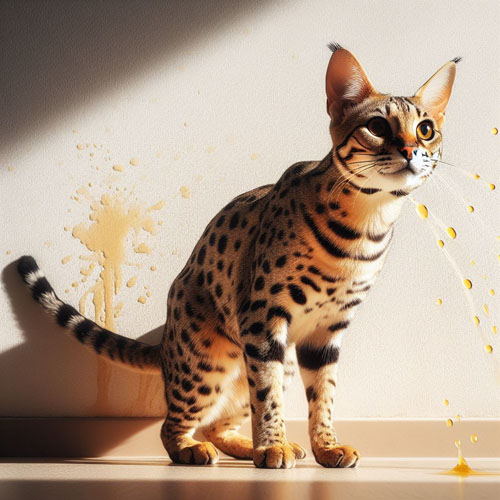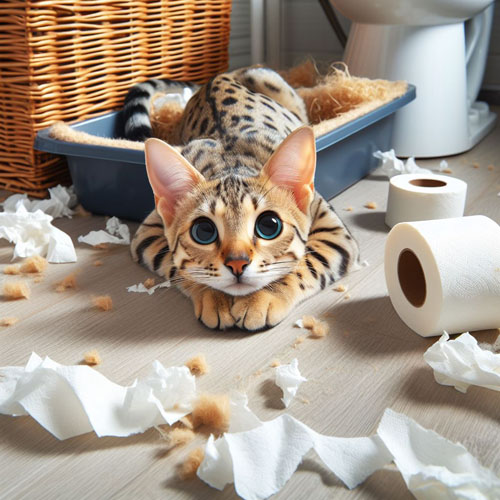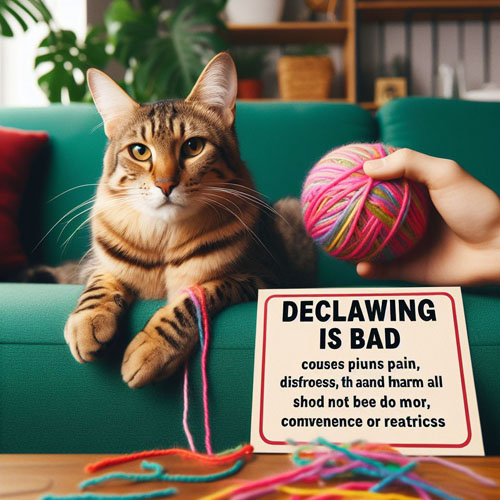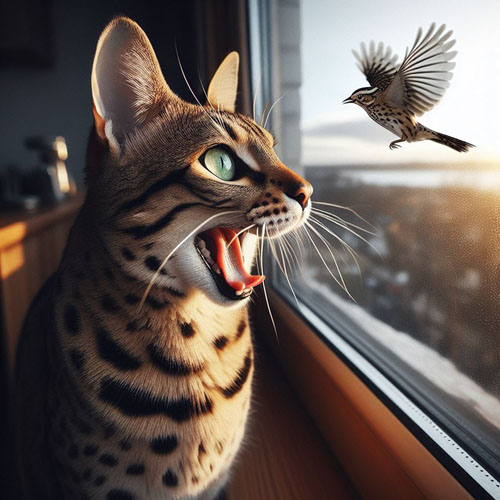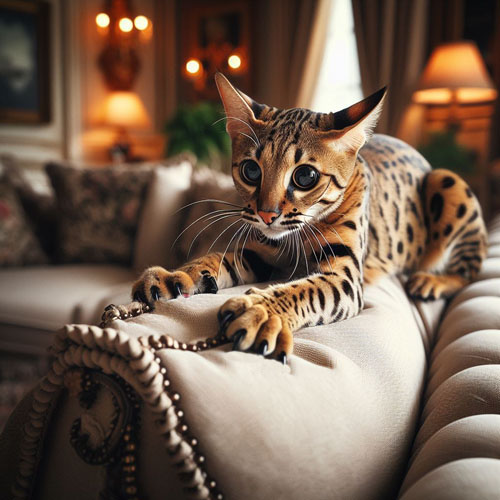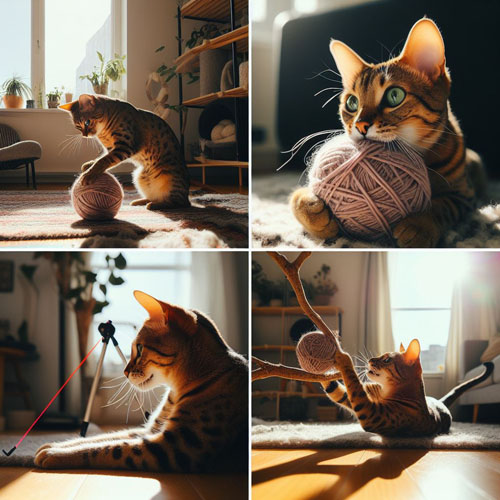The Intricate Behaviors of Savannah Cats
Unraveling the Enigma: Exploring the Intricate Behaviors of Savannah Cats
Savannah cats stand out for their striking appearance and exotic looking allure. Owners of Savannah cats often find themselves navigating the nuances of their feline friend’s interactions, from friendly curiosity to a more reserved demeanor. Understanding and respecting the individuality of each Savannah cat is essential in fostering a strong and trusting relationship. While these feline companions bring joy and fascination to their owners, their behaviors often unfold as a captivating tapestry of peculiarities. In this extended exploration, we delve deeper into the fascinating world of Savannah cat behaviors, unraveling the reasons behind their quirky tendencies.
Hyperactive Playfulness: One of the most conspicuous features of Savannah cats is their seemingly boundless energy and hyperactive playfulness. These felines, with their wild serval lineage, inherit a penchant for acrobatic feats and playful antics reminiscent of their untamed ancestry. Savannah cats may be observed leaping to great heights, scaling furniture with remarkable agility, and engaging in games of fetch with unparalleled enthusiasm. While this athleticism can be entertaining for owners, it also poses challenges in terms of keeping these dynamic cats mentally stimulated and preventing boredom-related mischief.
The incessant playfulness of Savannah cats is a testament to their need for physical and mental engagement, reflecting their wild roots where survival instincts necessitate constant movement and agility. Consequently, owners of Savannah cats find themselves captivated by the constant displays of athleticism that redefine the conventional expectations of domestic feline behavior.
Following owners around the house: The tendency of Savannah cats to closely follow their human companions around the house is deeply rooted in their social and curious nature. These exotic looking felines form strong bonds with their owners, drawing on the domestic cat’s inclination for social interaction. Savannah cats are known for their loyalty and attachment to their human families, often viewing them as a source of comfort and security. The close following behavior can be interpreted as a manifestation of their desire for companionship and a reflection of their social instincts.
Furthermore, Savannah cats’ curious and inquisitive nature contributes to their inclination to follow people around. These cats have a heightened curiosity and a strong need to explore their surroundings. By shadowing their owners, Savannah cats aim to be a part of the ongoing activities, satisfy their curiosity about their human’s actions, and maintain a close connection. The close companionship and inquisitiveness displayed by Savannah cats make them distinctive and endearing pets, fostering a unique bond that extends beyond the conventional expectations of feline behavior.
Vocalization Extravaganza: Another distinctive trait of Savannah cats is their proclivity for vocalization. These hybrids, more loquacious compared to their domestic counterparts, produce an array of unique sounds ranging from chirps and meows to trills and purrs. This heightened vocal behavior is believed to be an inherited form of communication from the serval side, where vocal signals play a crucial role in the wild. Savannah cats utilize these sounds to express excitement, contentment, or to seek attention, creating a symphony of peculiar feline noises that can be both amusing and surprising for their human companions.
The chattiness of Savannah cats adds an unexpected layer to their personalities, challenging preconceived notions of cat communication. Owners may find themselves engaged in conversations with their vocal feline friends, fostering a unique and dynamic bond that transcends the typical quietude associated with domestic cats.
Water Fascination: Perhaps one of the most perplexing behaviors exhibited by Savannah cats is their affinity for water. Unlike many domestic cats that cringe at the thought of getting wet, Savannah cats often display a fascination with water-related activities. Owners report instances of their Savannah cats willingly playing in sinks, and bathtubs, or even joining them in the shower. This peculiar fondness for water is rooted in the serval’s natural habitat, where water is an integral part of their environment.
While not all Savannah cats share this trait, the ones that do challenge the stereotype of cats as water-averse creatures. This unexpected behavior adds an element of surprise and amusement for owners, as they navigate the unique preferences of their water-loving feline companions.
Unparalleled Curiosity: Savannah cats exhibit an extraordinary level of curiosity, transcending the typical inquisitiveness associated with domestic felines. Driven by their innate instincts, these cats display an insatiable desire to explore every nook and cranny of their surroundings. Owners often find their Savannah cats climbing to precarious heights, investigating household items with unmatched enthusiasm, and squeezing into tight spaces in pursuit of their relentless curiosity.
This heightened curiosity stems from the serval’s natural inclination to be aware of potential threats in the wild. Owners of Savannah cats must maintain vigilance to ensure the safety of their curious companions, striking a balance between allowing exploration and preventing inadvertent mishaps.
Weird Foods Savannah cats, known for their distinctive behaviors, extend their eccentricities even to their dietary preferences. Some owners have reported their Savannah cats displaying a penchant for what can only be described as “weird” foods. Unlike conventional domestic cats, these hybrids may express interest in fruits, vegetables, or even non-traditional cat treats. Some Savannah cats have been observed nibbling on lettuce, and carrots, or even enjoying the occasional taste of watermelon. This departure from typical feline dietary habits adds a surprising element to the feeding routine, challenging owners to accommodate the unique taste buds of their exotic companions.
The reasons behind these unconventional culinary preferences can be traced back to the serval’s omnivorous tendencies in the wild. Servals are known to incorporate a variety of foods into their diet, including vegetation and small prey. While domestication has influenced the dietary habits of Savannah cats, their genetic makeup may still manifest in quirky eating habits. For owners, discovering and catering to their Savannah cat’s unusual food preferences becomes an interesting aspect of nurturing a bond with these extraordinary feline companions, adding an unexpected twist to the culinary adventures of pet ownership.
Burying thier food: Savannah cats, with their unique blend of domestic and wild traits, sometimes exhibit a curious behavior of burying their food using objects found within the house. This behavior harkens back to their wild ancestry, where the act of burying prey served the dual purpose of hiding it from potential predators and saving it for later consumption. In a domestic setting, Savannah cats may transfer this instinct to their feeding routine, using available objects like toys, clothing, or even household items to cover their food. This behavior can be intriguing for owners, as it provides a glimpse into the cat’s primal instincts and their attempt to create a sense of security around their meal.
The act of burying food with objects can also be linked to the Savannah cat’s territorial nature. In the wild, servals, the wild ancestors of Savannah cats, mark their territory by burying food, leaving scents around, and creating a distinct boundary. In a domestic environment, this behavior may manifest as a way for Savannah cats to assert control over their living space and establish a sense of ownership. While the behavior might seem peculiar in a domestic setting, understanding its roots in the cat’s evolutionary history sheds light on the fascinating interplay between the wild instincts and domesticated behaviors exhibited by these exotic feline companions.
Suckling and Kneading: Savannah cats, with their unique blend of domesticity and wild ancestry, often exhibit distinctive behaviors that echo their innate instincts. One such behavior that stands out is the tendency to suckle and knead, a trait deeply rooted in their early experiences as kittens. Many Savannah cats retain this endearing behavior into adulthood, captivating their owners with a display reminiscent of their kittenhood. The act of suckling involves rhythmically pressing their tongue against soft surfaces, whether it be a plush blanket or their owner’s clothing, while kneading entails alternating paw movements, pressing and releasing against the chosen surface.
The suckling and kneading behaviors in Savannah cats are often linked to feelings of comfort, security, and contentment. In their formative weeks as kittens, these actions were essential for nursing and stimulating milk flow from their mothers. As Savannah cats grow older, this behavior may persist as a comforting ritual, akin to a human thumb-sucking habit. For owners, observing their Savannah cat engage in suckling and kneading provides a glimpse into the intricate blend of wild instincts and domestic affection that defines these unique feline companions, creating a bond that transcends the conventional expectations of cat behavior.
Toy and Foreign Object Eating: Savannah cats, renowned for their playful and curious nature, occasionally exhibit a peculiar behavior that captures the attention of their owners: the inclination to “eat” toys or foreign objects. This can happen out of boredom or from a psychological issue called Pica. This quirky behavior can be an extension of their predatory instincts and high energy levels a well. Savannah cats, with their wild serval ancestry, possess a strong hunting drive, and their play often mimics the behavior of stalking and capturing prey. In their fervor for interactive play, some Savannah cats may mistakenly view small toys or foreign objects as potential prey items, prompting them to bite, chew, or even attempt to consume these items.
This inclination towards toy or foreign object eating emphasizes the importance of providing Savannah cats with appropriate outlets for their hunting instincts. Owners must be vigilant in selecting toys that are safe for their feline friends and supervise playtime to prevent the accidental ingestion of non-food items. Understanding and accommodating this unique aspect of their behavior enables owners to create an enriching environment for their Savannah cats, striking a balance between satisfying their predatory inclinations and ensuring their safety during play. While the quirkiness of toy or foreign object eating may present challenges, it adds an unexpected dimension to the dynamic relationship between owners and their exotic Savannah companions.
Selective Social Behavior: The social dynamics of Savannah cats add another layer of complexity to their behaviors. While these felines form strong bonds with their human companions, they may exhibit caution or aloofness around strangers. This selective social behavior is deeply rooted in the serval’s wild instincts, where wariness of potential threats is a survival mechanism.
Walking on a leash: Training Savannah cats to walk on a leash can be a surprisingly smooth and rewarding process, thanks to their high intelligence and playful disposition. Unlike some other domestic cat breeds that may resist leash training, Savannah cats often exhibit an adventurous spirit and curiosity, making them more amenable to the idea of exploring the outdoors on a leash. Begin by introducing the harness gradually, allowing the cat to get accustomed to the sensation of wearing it indoors. Positive reinforcement, such as treats and praise, can be highly effective in encouraging the cat to associate the harness with positive experiences.
Once the cat is comfortable with the harness, gradually introduce the leash in a controlled indoor environment before venturing outdoors. The responsive and trainable nature of Savannah cats makes them quick learners, and many owners find that these feline companions adapt surprisingly well to walking on a leash. This training not only provides mental stimulation and physical exercise for the cat but also allows owners to share outdoor adventures with their Savannah cats, fostering a unique and enriching bond between human and feline.
In conclusion, the weird and wonderful behaviors of Savannah cats can be traced back to their unique genetic makeup, combining domestic cat traits with the untamed instincts of servals. From hyperactive playfulness and vocalization extravaganzas to water fascination, unparalleled curiosity, and selective social behavior, Savannah cats offer a multifaceted feline experience. While these quirks may present challenges for some owners, many find joy in embracing the distinctive and sometimes eccentric nature of these captivating hybrid cats. Understanding the origins of these behaviors deepens the connection between owners and their enigmatic Savannah companions, fostering a relationship that goes beyond the ordinary realms of feline companionship.
